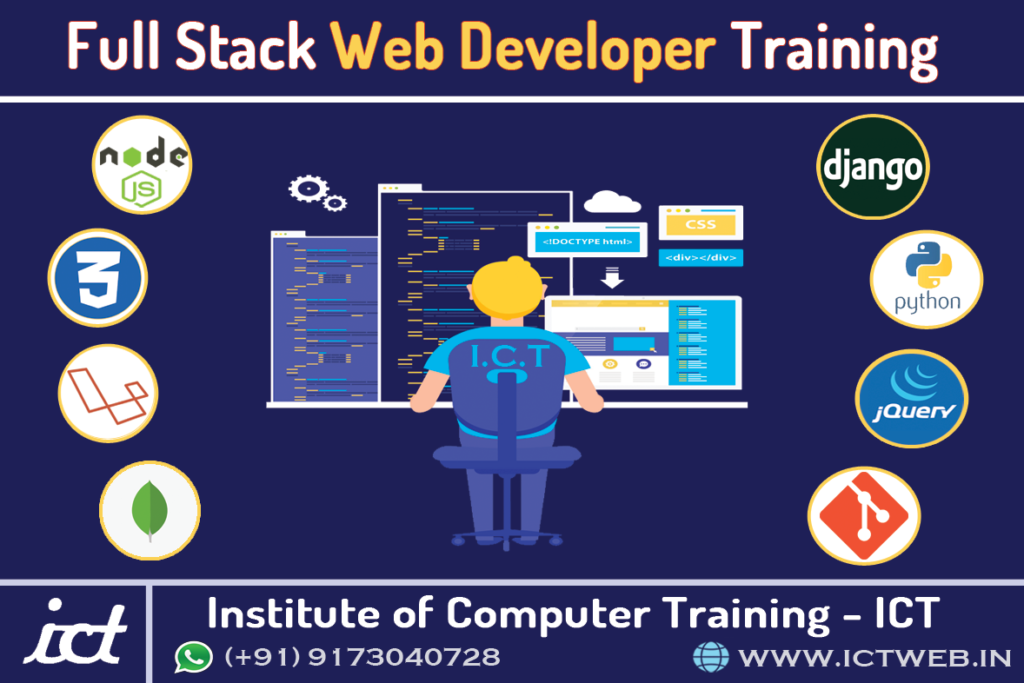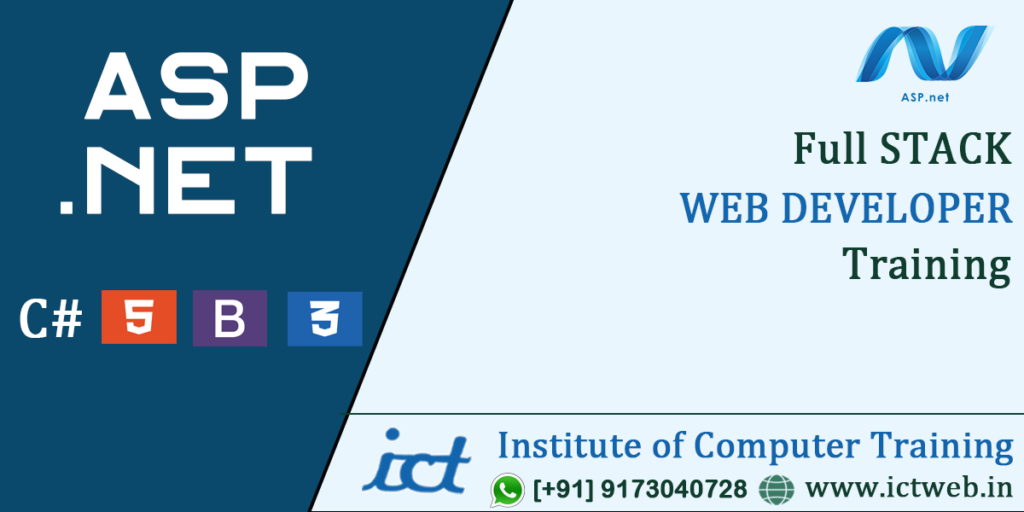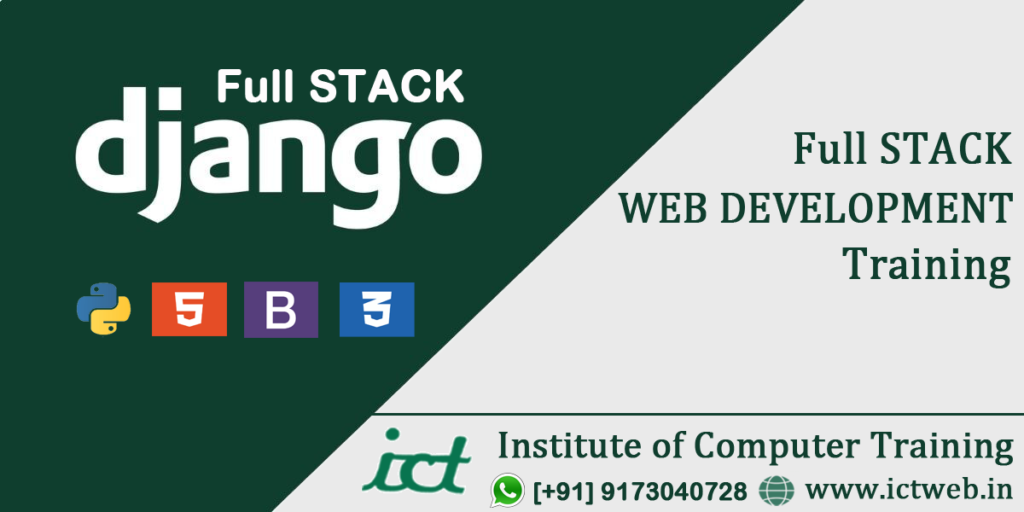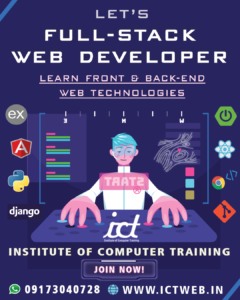Let’s Full-Stack Web Development become a Full Stack Developer, Build Web Application by using front & back-end Web Technologies, Today most growing and demanding in IT Field for full stack website scratch to final deployment process, ICT – Institute of Computer Training @ict_ahmedabad gives best fullstack training course in Python-Django, C-Sharp – Dot Net MVC, PHP – Laravel, WordPress, React, MongoDB, SQL, jQuery, HTML, CSS, SASS, Express JS, Node JS, Advanced JavaScript, Java Spring Boot, GIT Version Control, Web Developer Tools. We provide best framework training with job-oriented contents which help to achieve your goal quickly. Join for best IT Training courses, Get Admission Today!


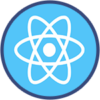
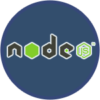
The MERN stack is a popular and open-source technology stack for building full-stack web applications using MongoDB, Express, React, and Node.js. It is known for its flexibility, scalability, and efficiency in building modern web applications, making it a preferred choice for developers looking to build dynamic, responsive, and high-performing web applications. Learn Agile and Scrum methodologies to deliver projects on time, and learn the building blocks of HTML, CSS, and Javascript.
Develop a comprehensive understanding of Git to manage version control systems.Build a robust foundation in React, unleashing your potential to create and manage captivating user interfaces. Embark on a guided curriculum, spanning JSON Server operations, React essentials, advanced rendering, and more, to elevate your expertise and unlock limitless possibilities in modern web development.
This meticulously structured curriculum dives deep into mastering NoSQL concepts for efficient non-relational data management and crafting scalable server-side applications with adeptness in asynchronous operations, which sets the stage for your success in modern application development. The capstone projects designed in this training will provide you with
the opportunity to apply your full stack development skills and tackle real-world industry-relevant problems. You will also learn to set up and manage your Git portfolio.
The DOT NET Training in Ahmedabad at ICT is an immersive learning program that aids the participants to have a comprehensive understanding of Dot Net Coding and its Space using the C# under the mentorship of real-time Dot Net Expert. Within the course of Dot Net Training, you will become proficient with the Dot Net Development process inclusive of the Data connection, Visual Studio Environment, HTML, CSS, Bootstrap, JavaScript, jQuery, Framework, Database, WebForms projects, and C# language. The .NET Training in Ahmedabad at ICT aids the learners with necessary career assistance to impart in-demand skills and knowledge that are highly sought after.
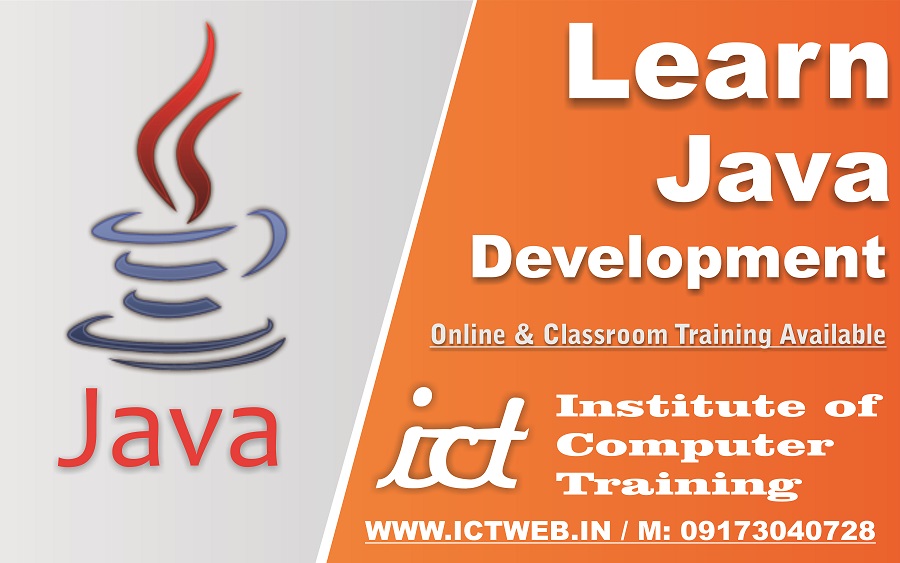
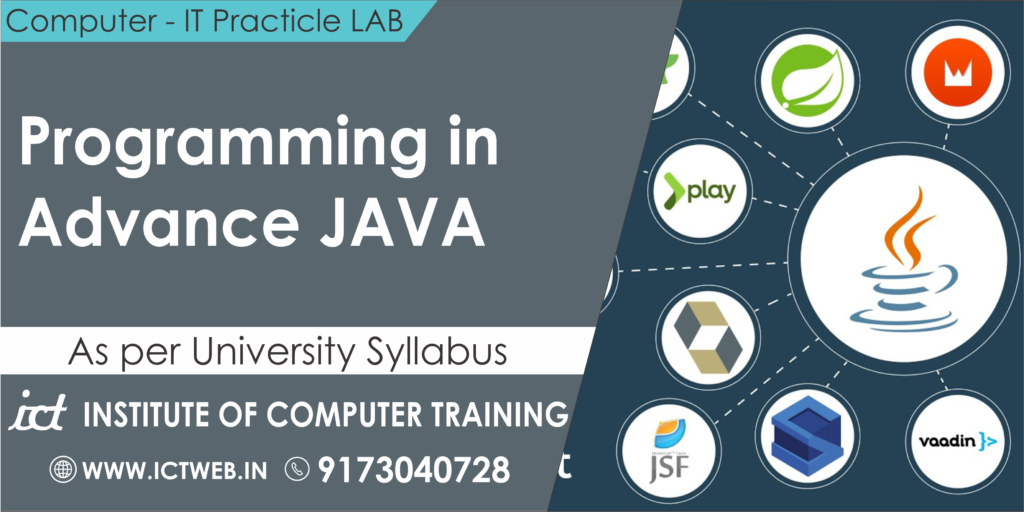
ICT gives Spring course training at ahmedabad. Spring course are designed to help learn the fundamentals of the Spring framework and gain the skills necessary to build enterprise-level applications for students and professionals. These courses cover topics such as dependency injection, IoC container, Database, MVC architectural design pattern, mail services, and security. ICT Ahmedabad also provide hands-on experience with the Spring framework and help students to prepare for certification, exams and interviews.Enroll now!
Django Full Stack Training & Certification | ICT Ahmedabad
Institute of Computer Training – ICT offers an full-stack web development course to build excellent web application by using django, html, css, bootstrap etc. We covers python basic program and top django syllabus to build excellent web application.
Now a day django web framework is an extremely in-demand skill that pays quite well. Django is used by a lot of startups to build great web applications. Django is fully job oriented program to get quickly job at IT company or develop your skills by learning new technology to upgrade your CV. Learn from ICT where best django training institute in Ahmedabad, India. Django Training at ICT Bopal, South Bopal Ahmedabad.
Frequently Asked Questions (FAQs) about Full Stack Web Developer courses:
1. What is a Full Stack Web Developer?
A Full Stack Web Developer is a developer who works on both the front-end and back-end of web development. They are proficient in all layers of development, including:
- Front-end: The user interface (UI) part, which is what users interact with (HTML, CSS, JavaScript).
- Back-end: The server-side, including databases, server logic, and APIs (e.g., Node.js, Python, Ruby, PHP).
- Database: Knowledge of database management systems (e.g., MySQL, MongoDB, PostgreSQL).
2. What topics are covered in Full Stack Web Developer courses?
Typical Full Stack Web Developer courses cover the following topics:
- HTML/CSS: Structure and styling of web pages.
- JavaScript: Programming language used for interactive front-end features.
- Front-end Frameworks: React, Angular, or Vue.js.
- Back-end Development: Node.js, Express, Ruby on Rails, or Django.
- Databases: SQL (MySQL, PostgreSQL) and NoSQL (MongoDB).
- Version Control: Git and GitHub for code management.
- APIs: RESTful APIs and GraphQL.
- Deployment: How to deploy web apps using platforms like Heroku.
- Security and Authentication: Protecting web applications and implementing user login systems.
3. Do I need prior experience to take a Full Stack Web Developer course?
No, many Full Stack Web Developer courses are designed for beginners. However, a basic understanding of programming concepts or familiarity with HTML and CSS can be helpful.
4. How long does it take to complete a Full Stack Web Developer course?
The time to complete a Full Stack Web Developer course varies depending on the format:
- Training: Typically last 12–24 weeks if you’re studying full-time.
- University Degrees: A bachelor’s degree in computer science or a related field can take 3–4 years.
5. What is the difference between a Full Stack and a Front-End/Back-End developer?
- Front-End Developer: Focuses on the UI and UX of web applications (HTML, CSS, JavaScript, React).
- Back-End Developer: Works on the server-side of the application (databases, server logic, APIs).
- Full Stack Developer: Proficient in both front-end and back-end development, able to build an entire web application from start to finish.
6. Are Full Stack Web Developer courses worth the investment?
Yes, if you’re interested in web development, a Full Stack Web Developer course is a great investment. Full-stack developers are in high demand due to their ability to handle all parts of the development process. The potential to earn a good salary and work on diverse projects makes it a valuable skill set.
7. What career opportunities are available after completing a Full Stack Web Developer course?
After completing a Full Stack Web Developer course, you can pursue roles like:
- Full Stack Developer
- Front-End Developer
- Back-End Developer
- Web Developer
- Software Engineer
- UI/UX Designer (with additional focus on design)
- DevOps Engineer (if you expand into infrastructure)
- Freelance Web Developer or Consultant
8. What are the job prospects for Full Stack Web Developers?
Full Stack Web Developers are in high demand across industries such as tech, finance, healthcare, and e-commerce. Companies prefer developers who can manage both the front-end and back-end of their websites or applications. The demand for web developers is expected to continue growing as more businesses move online.
9. How much can a Full Stack Web Developer earn?
Salaries for Full Stack Web Developers can vary based on location, experience, and the company. In the U.S., the average salary is typically between $70,000 to $120,000 per year, with senior-level or specialized developers earning more. Remote work opportunities also offer competitive salaries.
10. Is it possible to become a Full Stack Developer without a degree?
Yes, it is absolutely possible. Many people become Full Stack Developers through ICT Ahmedabad Full Stack Training Center. Building a strong portfolio of projects is often more important than formal education when applying for jobs.
11. What tools and technologies should I be familiar with as a Full Stack Developer?
In addition to the basic languages (HTML, CSS, JavaScript), a Full Stack Developer should know:
- Version control: Git and GitHub.
- Package managers: npm (Node.js), yarn.
- Frameworks and libraries: React, Angular, Vue.js for front-end; Express, Django, Flask, or Ruby on Rails for back-end.
- Databases: MySQL, PostgreSQL, MongoDB.
- APIs: RESTful and GraphQL.
- Deployment: AWS, Heroku, Docker.
- Testing frameworks: Jest, Mocha, or Selenium.
- DevOps tools: Jenkins, Kubernetes.
12. How do I build a portfolio as a Full Stack Developer?
A strong portfolio showcases your skills. Include personal or freelance projects, contributions to open-source projects, and any internships or work experience. Focus on:
- A variety of full-stack projects.
- Code hosted on GitHub.
- Clear documentation and explanations of your work.
- Demonstrations of both front-end and back-end skills.
Enroll Full Stack Web Developer course at Ahmedabad or Call us: 9173040728.

